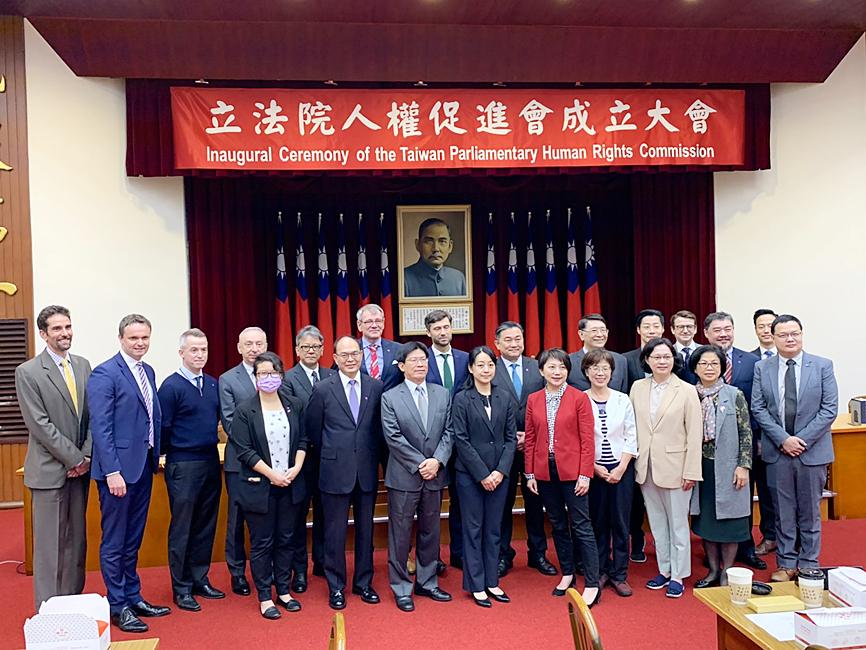Lawmakers yesterday at the legislature in Taipei said that their primary mission would be to aid Hong Kongers in their struggle against Chinese oppression as they attended the inauguration of the Taiwan Parliamentary Human Rights Commission.
In his opening remarks, Democratic Progressive Party (DPP) Legislator Wang Ting-yu (王定宇), initiator and chairman of the commission, said that this year has been exceptional for people all over the world.
Everyone is facing the COVID-19 pandemic together, yet at the same time, human rights are being restricted, Wang said.

Photo: CNA
In Hong Kong, Joshua Wong (黃之鋒), Agnes Chow (周庭) and other young democracy advocates are being persecuted, but they are not exceptional cases, rather they are part of a larger trend of human rights violations at the hands of Beijing, he said.
People are used to tracking a nation’s development with measures such as GDP, but hopefully in the future human rights would instead serve as the barometer, he added.
Legislative Yuan Secretary-General Lin Jih-jia (林志嘉) said that human rights are an extremely important guidepost for Taiwan, which it has over the years worked tirelessly to advance as part of its democracy.
The nation must shine brightly on the world stage, Lin said, adding that a vital mission of the legislature is to facilitate parliamentary friendship groups with nations worldwide.
The commission would communicate with the world through the language of human rights with its advocacy and actions, he said.
The biggest difference between Taiwan and China is the former’s democracy and freedom, he added.
Beijing even goes so far as to suppress human rights, Lin said, pointing to the “brave young people” fighting for freedom and democracy in Hong Kong.
They are paying such a high price for their fight against an autocratic government and China’s oppression of Hong Kongers holds a particular significance for Taiwan, he said.
Taiwan People’s Party Legislator Lai Hsiang-lin (賴香伶), vice chairwoman of the commission, said that in the past few days the Hong Kong government has been cracking down on young democracy advocates, putting Taiwan on high alert.
Taiwanese hope never to have to live in the shadow of “one country, two systems,” Lai said.
Hong Kong’s democratic system used to outshine Taiwan and serve as an example, but now it is Taiwan that is upholding the beacon of democracy in Asia, she said.
In Hoklo (also known as Taiwanese) the saying “The sun will always rise” (天總是攏會光) encourages perseverance in the face of adversity, National Human Rights Commission Vice Chairman Kao Yung-cheng (高涌誠) said.
Taiwanese must adhere to this saying, advancing human rights at home while working with others to safeguard people’s rights around the globe, he said.

POSITIVE DEVELOPMENT: Japan and the US are expected to hold in-depth discussions on Taiwan-related issues during the meeting next month, Japanese sources said The holding of a Japan-US leaders’ meeting ahead of US President Donald Trump’s visit to China is positive news for Taiwan, former Japan-Taiwan Exchange Association representative Hiroyasu Izumi said yesterday. After the Liberal Democratic Party’s landslide victory in Japan’s House of Representatives election, Japanese Prime Minister Sanae Takaichi is scheduled to visit the US next month, where she is to meet with Trump ahead of the US president’s planned visit to China from March 31 to April 2 for a meeting with Chinese President Xi Jinping (習近平). Japan and the US are expected to hold in-depth discussions on Taiwan-related issues during the

‘LIKE-MINDED PARTNER’: Tako van Popta said it would be inappropriate to delay signing the deal with Taiwan because of China, adding he would promote the issue Canadian senators have stressed Taiwan’s importance for international trade and expressed enthusiasm for ensuring the Taiwan-Canada trade cooperation framework agreement is implemented this year. Representative to Canada Harry Tseng (曾厚仁) in an interview with the Central News Agency (CNA) said he was increasingly uneasy about Ottawa’s delays in signing the agreement, especially as Ottawa has warmed toward Beijing. There are “no negotiations left. Not only [is it] initialed, we have three versions of the text ready: English, French and Mandarin,” Tseng said. “That tells you how close we are to the final signature.” Tseng said that he hoped Canadian Prime Minister Mark Carney

Taiwan has received more than US$70 million in royalties as of the end of last year from developing the F-16V jet as countries worldwide purchase or upgrade to this popular model, government and military officials said on Saturday. Taiwan funded the development of the F-16V jet and ended up the sole investor as other countries withdrew from the program. Now the F-16V is increasingly popular and countries must pay Taiwan a percentage in royalties when they purchase new F-16V aircraft or upgrade older F-16 models. The next five years are expected to be the peak for these royalties, with Taiwan potentially earning

President William Lai (賴清德) yesterday bestowed one of Taiwan’s highest honors on Saint Vincent and the Grenadines (SVG) Ambassador Andrea Clare Bowman in recognition of her contributions to bilateral ties. “By conferring the Order of Brilliant Star with Grand Cordon on Ambassador Bowman today, I want to sincerely thank her, on behalf of the Taiwanese people, for her outstanding contribution to deepening diplomatic ties between Taiwan and SVG,” Lai said at a ceremony held at the Presidential Office in Taipei. He noted that Bowman became SVG’s first ambassador to Taiwan in 2019 and